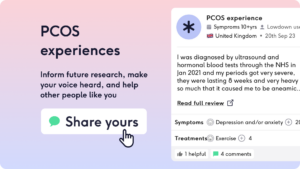
What is PCOS belly? The Lowdown on PCOS and bloating
What's the lowdown?
Polycystic ovary syndrome (PCOS) is a hormonal condition that can impact women who are of reproductive age
Bloating is one of the most common symptoms, with 77% of PCOS sufferers dealing with bloating
PCOS can also lead to weight gain, particularly around the abdominal area, which is often described as ‘PCOS belly’
✔️If you think this blog will be informative, make sure to check out our newsletter for more:
What is PCOS?
Polycystic ovary syndrome (PCOS) is a common hormonal condition. The condition impacts the way the ovaries work and it affects an estimated 8–13% of reproductive-aged women [1]. There are three main symptoms; the first is irregular periods, usually because the ovaries are not regularly releasing eggs. The second is excess levels of androgenic (male) hormones, which can cause acne and excess facial or body hair. And the third common sign or symptom is ovaries which may be enlarged and contain fluid-filled sacs known as follicles, surrounding the eggs seen on ultrasound. You can read about how PCOS affects individuals in The Lowdown community through their shared experiences.

How PCOS can affect your weight
It’s common for people who suffer from PCOS to notice a difference in their weight due to the condition. “The disrupted/elevated hormone levels associated with PCOS can cause weight gain by increasing hunger, supporting storage of fat, and making the breakdown of stored fat harder for the body,” explains Sarah Welsh, gynaecologist and founder of the sexual wellness brand HANX.
This means it isn’t simple cause and effect and being diagnosed with PCOS does not mean that you will gain weight. However, many people who have PCOS also have insulin resistance, which experts consider to be a contributing factor to obesity. “This can also make it harder to lose weight, which can be frustrating as some studies show that weight loss is one of the most impactful ways to manage PCOS,” Welsh adds.
What are the stomach symptoms of PCOS?
People who have PCOS might also suffer from various digestive issues. Bloating is very common for people who have PCOS, along with some other problems affecting the stomach. “Bloating is one of the most common symptoms associated with PCOS, alongside gut issues, constipation, diarrhoea and IBS. Some experience pain or discomfort after eating, too,” Welsh says.
“Research shows that people with PCOS often have an imbalance of gut bacteria, which can impact digestion and result in painful or uncomfortable bloating after meals,” she continues. “It can also be caused by hormones, which is associated with fluid retention.” A recent study published in the journal Frontiers in Cellular and Infection Microbiology found that there are “complex and close interactions between PCOS and gut microbiota” [2]. Therapist to restore microbiota in the gut (such as probiotics) could also potentially help to counteract PCOS, according to another study [3].
What is ‘PCOS belly’?
Bloating is one of the most common symptoms of PCOS. In fact, 77% of people with PCOS suffer regularly from bloating, according to a recent study [4].
The phrase ‘PCOS belly’ has also been coined to describe the excess abdominal fat many people who suffer from PCOS deal with. Research suggests that people who have PCOS might be more likely to gain weight around the abdominal region, compared to other areas of the body. A 2018 paper [5] found that women with PCOS had around 17% more of both subcutaneous abdominal fat (the fat you can see and feel on your stomach) and visceral abdominal fat (the fat that is found deeper in your organs). We know how emotive weight gain is for you if you have PCOS, and we’re here to support. You can use our reviews to see what has worked for other people, or check out our partner dietitians who are experts in PCOS.
What causes ‘PCOS belly’?
There’s no definite answer as to what causes ‘PCOS belly’, but there is some research to suggest what some of the contributing factors might be. Hormonal changes have been linked with bloating in people with PCOS, according to a 2022 study [6]. Researchers working on this paper looked into hormonal changes that may affect gut flora and bile acids associated with digestion, leading to bloating.
People who have PCOS are also more likely to suffer from IBS. 29.7% of people with PCOS also have IBS, compared with 11% of people without PCOS, research in a 2020 study found [7]. Researchers working on this paper theorised that the stress and anxiety associated with PCOS may make IBS more common for people with the condition, as stress can impact gastrointestinal functioning.
Welsh explains that ‘PCOS belly’ could just come down to the way the body stores fat for people with insulin resistance. “When we’re stressed out or experiencing inflammation, our body produces stress hormones, and increases insulin resistance,” she says. “This means your body can’t properly convert glucose to energy, so it remains stored in the body and can cause weight gain, especially around your middle if you have PCOS.”
One other factor to consider is combined oral contraceptives, a type of birth control that many people who suffer from PCOS use to manage their symptoms. Fluid retention (or bloating) is a known side effect of combined contraceptives so the treatment of PCOS could even be causing some of the PCOS belly!
Ultimately, everyone’s bodies are different so everyone’s experience of PCOS and the symptoms that come with it, and why they happen, will be different too. You can anonymously share your experiences of PCOS with The Lowdown community to raise awareness of how the condition affects individuals, and potentially connect with others who have had similar experiences.
Is there anything that can help with PCOS bloating?
There are various ways to try and reduce bloating for people who have PCOS. “Medication is an option,” Welsh says. “There are treatments available, such as Simethicone, which helps reduce gas symptoms such as bloating.” And trialing different brands of combined pill may improve bloating. For example, some people find the pill brands with an anti-androgenic progestogen (like Yasmin, Eloine or Slynd) can improve bloating as they help your body get rid of excess fluid.
But there are also a number of diet and lifestyle changes you can make to try to reduce your symptoms. “Eating a Mediterranean diet, which contains fish, healthy fats such as avocado, legumes and plenty of fibre from fruits and vegetables, can help support the good bacteria in your gut and reduce bloating,” Welsh suggests. You can also use supplements to support your healthy gut bacteria, like JERMS.
There are certain foods that can induce high levels of insulin, such as red meat, sugary drinks and processed foods, so it’s best to avoid these to reduce PCOS belly. “Some research shows that a cup of green tea a day is beneficial at reducing bloating,” Welsh recommends [8].
One PCOS sufferer shared her experience with The Lowdown of switching to a plant-based diet, which improved her symptoms
Regular exercise is also a good way to reduce bloating. “Even a brisk walk once a day can help with your digestion, improve metabolism and ease discomfort from a sore belly,” Welsh says.
Are you more likely to bloat during ovulation?
Ovulation is the phase of the menstrual cycle during which the ovary releases an egg as it prepares for a potential pregnancy, which means the body is going through a lot of hormonal changes. “Whether you have PCOS or not, these hormonal changes can cause bloating,” Welsh says. “Oestrogen causes water retention, which can exacerbate bloating.”
How can you tell if your bloating is caused by PCOS?
It can be difficult to figure out exactly what is causing bloating or weight gain and even more so if you have a condition like PCOS. “It’s best to have an open chat with your GP or health practitioner, and go into your appointment with your ideal outcome in mind,” Welsh recommends.
It’s important to remember that bloating can be caused by other medical conditions, so you should always speak to your healthcare provider. Especially if the bloating is associated with any other symptoms like urinary or bowel problems, bleeding from the back passage or usual vaginal bleeding or discharge.
“They’ll likely want to understand your health history, run some hormone or blood tests and possibly an ultrasound scan to help determine if you have PCOS,” she continues. “From there, they should also be able to determine if your bloating is indeed PCOS related, or something different.”

Our medical review process
This article has been medically reviewed for factual and up to date information by a Lowdown doctor.






